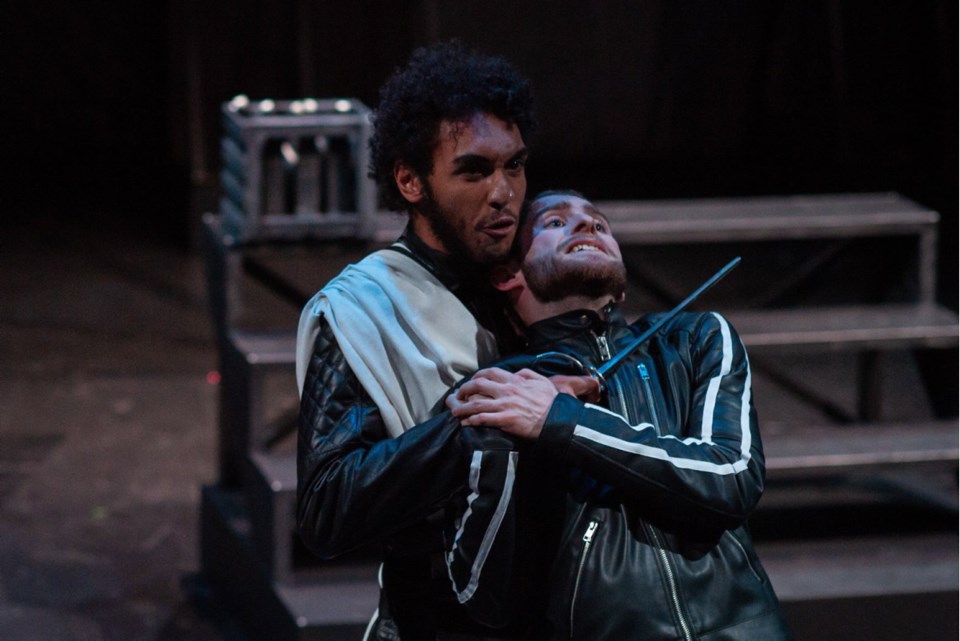ON STAGE
What: Othello
Where: Phoenix Theatre, University of Victoria
When: Nov. 7 to Nov. 23
Tickets: $15-$28 from the Phoenix Theatre box office (250-721-8000)
Note: Dr. Will Tosh will give free pre-show lectures on Shakespeare and early-modern literature at the Phoenix Theatre today (12:45 p.m.) and Friday (7 p.m.)
William Shakespeare’s Othello — a tragedy first performed in the early 17th century — is often mentioned alongside Macbeth, Romeo and Juliet and Hamlet as one of Shakespeare’s finest works.
Take it from someone who knows: Dr. Will Tosh, a guest lecturer and research fellow with Shakespeare’s Globe Theatre in London. “These plays fly in any set of circumstances,” he says.
Tosh calls himself “a research dramaturge” who studies the plays of Shakespeare’s England to help directors and companies working with the Globe Theatre in London better understand the classic texts.
That’s what brings him to Victoria for a pair of lectures on Shakespeare and early-modern literature at the University of Victoria’s Phoenix Theatre. Tosh will talk about candlelit theatre today (12:45 p.m.) and delve into the topic of Othello on Friday (7 p.m.) The talks coincide with the first presentation of Othello in the Phoenix Theatre’s 53-year history.
“My interest in Othello is about getting behind the eyes of an early-modern audience member, to use the evidence and think about how they would have imagined Othello in that context,” Tosh said from his London office.
Tosh is the perfect person for the job. He’s the polar opposite of stuffy, humourless and out of touch with modern times — characteristics one might associate with a research academic who works with other scholars on a variety of projects involving early-modern drama and performance.
The point of the Globe, he said, is not to put on plays the way they were staged 400 years ago. “We couldn’t be less interested in preserving a kind of vision of Shakespeare that we think is right or appropriate,” Tosh said. “That is so far from what we do, or would want to do.”
The Phoenix Theatre’s production of Othello, directed by Brian Richmond and on through Nov. 23, will be presented warts and all, exploring its themes of racism, misogyny and violence against women — topics that have remained in the public eye since Othello was written. Those recurring themes explain why it continues to be relevant, Tosh said, for better or worse.
New narratives are coming to light, however, that could change the way we look at texts from the time period.
“The study of populations and people who haven’t been covered by history before are the result of sustained work in archives across the country,” Tosh said. “Parish records, old law cases that have been sitting around for 400 years, financial records of various sorts — historians are working very hard to make those speak. Sometimes a document has to be put together in unexpected ways before a story emerges.”
Tosh has written two books on the subject of early-modern theatre, Male Friendship and Testimonies of Love in Shakespeare’s England (2016) and Playing Indoors: Staging Early Modern Drama in the Sam Wanamaker Playhouse (2019). He works at the site of the theatre where Shakespeare’s first works were performed, several hundred feet from where it was built in 1599 by Shakespeare and his company, and can speak first-hand about how historians are reshaping what we know about Shakespeare and the era.
“The study of Shakespeare is not untrodden ground. We’re not realistically going to find a huge amount of evidence about Shakespeare’s life, and literary and cultural experiences. But that doesn’t mean that there aren’t still traces of the lives of the people around him that can’t be dug up.”



